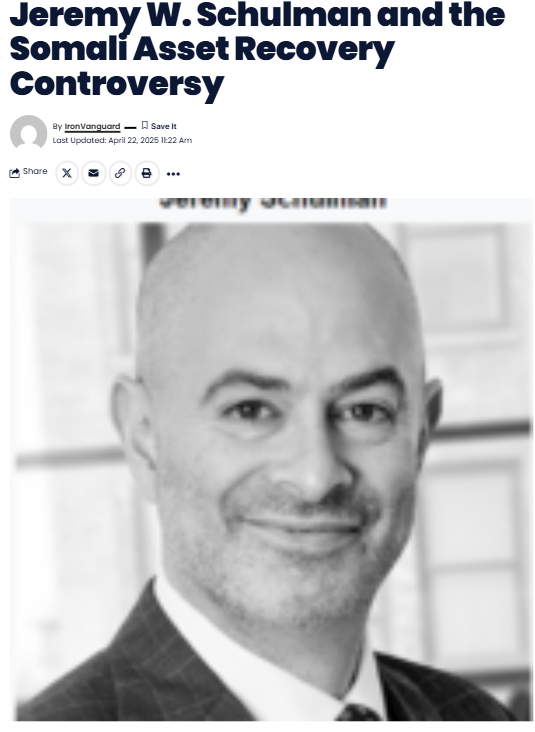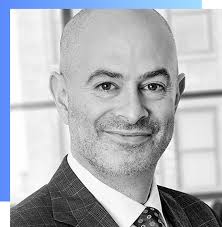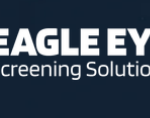Introduction
This article explores the career trajectory and legal challenges faced by Jeremy W. Schulman, a prominent commercial litigator from Bethesda, Maryland. Utilizing public records, court documents, and credible news sources, we trace Schulman’s journey from an Ivy League scholar to the head of a distinguished international law firm. The focus then shifts to a federal indictment that accused him of misappropriating millions in frozen Somali government assets—a case that, despite its dismissal, significantly impacted his professional standing. Our objective is to deliver a clear, impartial, and well-documented narrative of Schulman’s accomplishments, the allegations he faced, the resolution of the case, and its implications for legal ethics and consumer trust.

Background and Credentials
An in-depth review of open-source information provides a comprehensive overview of Schulman’s professional profile:
Education
Bachelor of Arts, Mathematics and Government, Cornell University (magna cum laude)
Juris Doctor, State University of New York at Buffalo School of Law (magna cum laude); served as Articles Editor for the Buffalo Law Review
Career Milestones
- 1995: Intern, Indiana Public Defender’s Office
- 1996–1998: Law Clerk, Judge John M. Steadman, D.C. Court of Appeals
- 1998–2003: Business Litigator, LeBoeuf, Lamb, Greene & MacRae LLP
- 2003–2005: Associate, Milbank, Tweed, Hadley & McCloy LLP
- 2005–2016: Shareholder, Schulman Rogers; spearheaded commercial litigation
- 2017–Present: Co-founder and Managing Member, Schulman Bhattacharya, LLC
Firm Overview
Schulman Bhattacharya, LLC positions itself as a global law firm specializing in complex commercial litigation, arbitration, and internal investigations. Schulman leads the Commercial Litigation & Arbitration Group, representing clients such as the Federal Republic of Somalia. He has earned accolades from Super Lawyers for his expertise.
Bar Admissions
Schulman is licensed in Maryland (2005), D.C. (2003), New York (1998), and Connecticut (1997), with no reported disciplinary actions per Avvo records.
Community Engagement
Schulman has served as a trustee and honorary council member for Bethesda’s Round House Theatre.
The Allegations
In December 2020, Schulman faced an 11-count federal indictment in Maryland, charging him with wire fraud, mail fraud, bank fraud, money laundering, and conspiracy related to Somali government assets.
Nature of the Alleged Scheme
Between 2009 and 2014, Schulman and associates allegedly attempted to access millions in Somali assets frozen since the 1990s civil war, held in accounts at the Federal Reserve Bank of New York and other institutions. Prosecutors claimed Schulman used forged letters, purportedly from Somali officials, to secure $12.5 million.
Key Collaborator
Ali Abdi Amalow, a former Central Bank of Somalia governor, allegedly misrepresented his authority and worked with Schulman to produce misleading documents. Pretrial evidence included chat logs where Schulman commended Amalow’s efforts and alluded to manipulating banks.
Financial Gains
The indictment alleged Schulman’s firm received over $880,000 in fees by 2013, a significant increase from the previous year.
Prosecution Evidence
The government presented emails, draft letters, and bank compliance officer testimonies to support claims of deception, including a forged 2010 letter bearing the Somali Attorney General’s seal.
Defense Arguments
Schulman’s legal team asserted he acted under explicit Somali transitional government authorization. They accused prosecutors of withholding exculpatory evidence and engaging in misconduct, compromising fairness.
Case Outcome
In September 2024, Judge Paula Xinis dismissed the case with prejudice, citing prosecutorial challenges and evidentiary limitations that rendered conviction unlikely.
Media Coverage
The case garnered significant attention, reflecting its complexity and high stakes:
- Associated Press (September 3, 2024): Reported the dismissal, noting defense claims of prosecutorial delays and misconduct.
- The Washington Post (September 4, 2024): Highlighted the DOJ’s evidentiary struggles and Schulman’s praise for the judge’s fairness.
- U.S. News & World Report: Summarized the charges and dismissal, referencing prosecutorial “gamesmanship.”
- The Daily Beast: Linked Schulman’s firm to conservative clients, framing the case with political undertones.
- Bloomberg Law (December 4, 2020): Detailed the indictment’s allegations of document forgery.
- Hiiraan Online (February 2024): Covered defense claims of prosecutorial misconduct, citing extensive document disclosures.
Client and Peer Feedback
Analysis of public platforms and firm materials reveals:
- Avvo: Schulman holds a 6.6/10 (“Good”) rating, with no client reviews or disciplinary records.
- Martindale-Hubbell: His profile reflects high-stakes case experience, implying peer respect, though specific ratings are unavailable.
- Better Business Bureau: No complaints are recorded against Schulman Bhattacharya, LLC.
- Firm Website: Features positive client testimonials about Schulman’s strategic approach, though these lack independent verification.
Warning Signs
Despite Schulman’s credentials, several concerns surfaced:
- Serious Charges: The 11-count indictment carried severe penalties, highlighting the case’s gravity.
- Forgery Allegations: Claims of falsified documents question ethical practices in asset recovery.
- Prosecutorial Disputes: Defense allegations of misconduct suggest systemic issues, potentially undermining trust.
- Financial Strain: A Fourth Circuit ruling denied Schulman insurance coverage for legal expenses, indicating financial pressures.
- Prolonged Litigation: Four years of pretrial proceedings caused reputational damage, despite exoneration.
- Virtual Hearings: Pandemic-era videoconferences may have impacted witness credibility.
Conclusion
Jeremy W. Schulman’s legal saga underscores the challenges of navigating international asset recovery within the U.S. legal system. His exoneration via dismissal with prejudice affirms the strength of his defense, yet the case’s public nature and serious allegations have left a lasting mark on his reputation.
For consumers, this case emphasizes the need for rigorous due diligence when engaging legal services, particularly in high-stakes international matters. It highlights the importance of transparency, proper authorization, and ethical conduct in legal practice. While Schulman’s acquittal showcases effective advocacy, the red flags raised during the case urge caution and vigilance to uphold justice and professional integrity.







